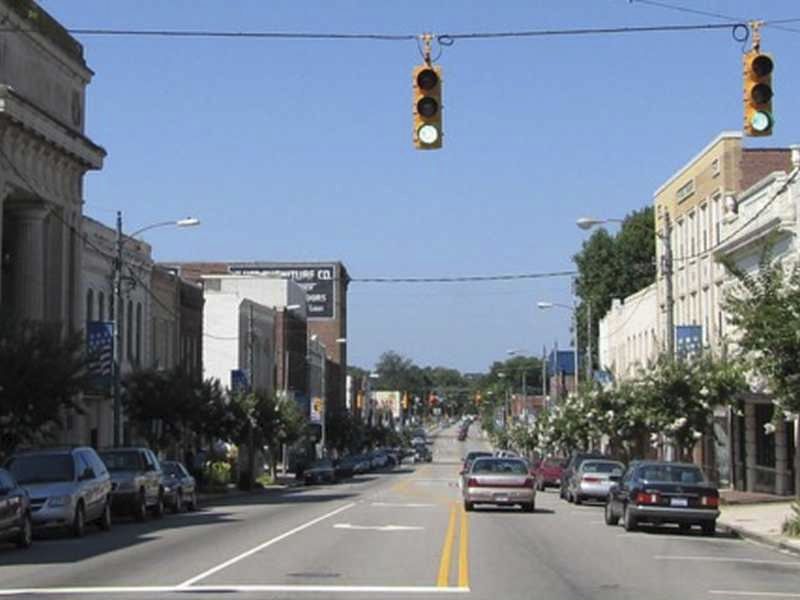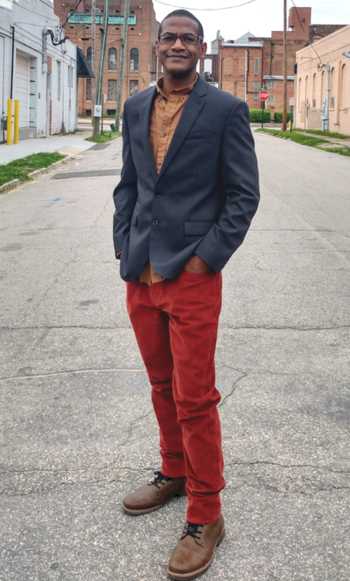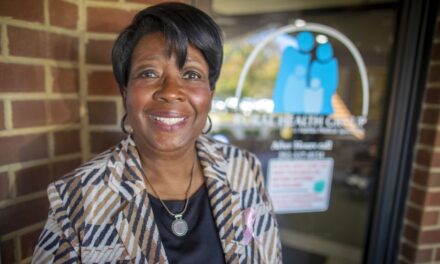Community Voices offers a pathway for change

Extension program gives citizens ways to contribute, invest in their communities.

Jason Spriggs stands with downtown Henderson as his backdrop. Spriggs completed the Community Voices program offered by Extension at A&T in 2019. By the end of the year, he had been elected to a seat on the Henderson City Council. Spriggs uses the skills he learned in Community Voices in efforts to clean up trash and remove abandoned buildings in the city.
HENDERSON – For several years Jason Spriggs wanted to serve his community as an elected official. But it took a notice in the local newspaper to put him on a path that would help him in his quest to become a member of the Henderson City Council.
“It was one of those moments when you see something and say, ‘That’s for me; that’s the perfect fit,’” Spriggs recalled. “The timing of the program was perfect.”
The program that caught his eye back in the spring of 2019 was Community Voices, a series of eight classes aimed at limited resource and non-traditional leaders. Created by Cooperative Extension at N.C. A&T, Community Voices helps citizens develop the skills needed to solve community problems. Most participants are new to public service and the program introduces them to the fundamentals of local government and volunteerism so they can work for change in their communities.
Spriggs had run for office unsuccessfully in 2013 when he lived in Raleigh and in 2015, when he made his first run for the Henderson City Council. In 2019, he decided to once again campaign for a seat on the city council. He was determined to fight the blight that plagued his city and bring new economic development opportunities to a community that still struggles from the impacts of lost manufacturing jobs, the 2008 recession, and most recently the impacts of the economic shutdown implemented to fight COVID-19.
“With a political campaign, you have to touch the hearts of people who vote; you have to touch on issues that people understand and can support,” he said. “Community Voices taught me how to do that. It’s a very tangible, hands-on way to learn how policy works.”
During Community Voices training, participants learn to work as part of a team to address a community issue. The course’s modules focus on the issues and skills used by successful leaders, including leadership styles, adopting a shared leadership approach, communication, and consensus building.
Participants who graduate from the class are considered Community Voices facilitators and are then able to train additional community members. Producing community-based facilitators is one way to create a consistent, long-term program that offers a framework for community engagement, according to Michelle Eley, Ph.D., community and economic development specialist with Cooperative Extension at N.C. A&T.
“Community Voices started back in the 1990s as a way to address the leadership vacuum that rural communities were facing at the time,” said Eley. “Since then, it has expanded to more urban areas, but the question remains the same: How do we invest in the people who are willing to stay in their community and want to contribute?”
The classes, said Eley, focus on action and collaborative problem solving. Class members select a community problem to address and work on developing a plan of action using a six-step problem-solving model. The 2019 Vance County class was a team effort, with coordination and planning provided by County Extension Director Turner Pride and D. Wayne Rowland, agriculture and natural resources technician, and several “graduates” of the course helping as trainers. In addition to the Vance County class, 2019 Community Voices training classes were offered to residents of Edgecomb and Nash counties (in Whitakers), Halifax County (Enfield), and Cumberland County (Fayetteville).
Spriggs and his Community Voices classmates attended classes at the Vance County Extension Center and zeroed in on the problem of blight in Henderson and how to clean up trash and litter and remove abandoned buildings to make economic development more feasible. They developed strategies, delegated tasks, made sure all team members were accountable for their tasks and to each other, and figured out how to measure their progress. They talked to county commissioners, directors of city departments, the heads of city and county committees and task forces, and the city and county managers. Since the class ended in July 2019, they’ve begun to see results from their efforts, and Spriggs has become a new at-large city council member.
“Blight keeps people from investing in a community,” said Spriggs. “But blight is a big issue and you need to focus on what you can do. We focused on trash, litter, abandoned buildings and generally cleaning up the town, and it’s working. You can see the changes happening.”
Keeping the conversation going
Spriggs said both the city of Henderson and Vance County have allocated money to pay for removing dilapidated and vacant mobile homes and about 15 structures are slated for removal. The city is examining major purchases – such as a truck – dedicated to trash and litter removal. He can now drive around Henderson and see cleaner streets and fewer abandoned buildings that become eyesores as they decay.
For the immediate future, Spriggs plans to continue to attack community blight while focusing on keeping his community safe from COVID-19. He had more than eight years of experience in local politics in Raleigh and in Henderson, spending time knocking on doors and working for state and local campaigns, all while raising five children with his wife and working as a certified water treatment operator. He now focuses full time on his city council work and says that community service is all about talking to people and balancing needs.
“One thing I’ve learned is that you cannot stop the conversation,” said Spriggs. “Our community needs to stay safe, especially because we are disproportionally affected (by COVID-19). But you still need to keep other things moving. Cleaning up our streets and neighborhoods, strengthening our educational system, developing strong art programs – all those things that make people want to move to an area – you need to keep that momentum going.”


